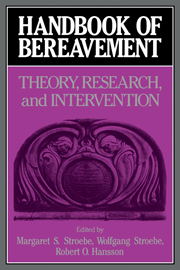Book contents
- Frontmatter
- Contents
- Contributors
- Preface
- Part I Introduction
- Part II The phenomenology and measurement of grief
- Part III Current theories of grief, mourning, and bereavement
- Part IV Physiological changes following bereavement
- Part V The psychological, social, and health impacts of conjugal bereavement
- Part VI Grief reactions to different types of loss
- Part VII Coping, counseling, and therapy
- 23 The meaning of loss and adjustment to bereavement
- 24 Old age and widowhood: Issues of personal control and independence
- 25 The support systems of American urban widows
- 26 The role of social support in bereavement
- 27 Bereavement self-help groups: A review of conceptual and methodological issues
- 28 Counseling and therapy of the bereaved
- Part VIII Conclusions
- References
- Author index
- Subject Index
23 - The meaning of loss and adjustment to bereavement
Published online by Cambridge University Press: 04 May 2010
- Frontmatter
- Contents
- Contributors
- Preface
- Part I Introduction
- Part II The phenomenology and measurement of grief
- Part III Current theories of grief, mourning, and bereavement
- Part IV Physiological changes following bereavement
- Part V The psychological, social, and health impacts of conjugal bereavement
- Part VI Grief reactions to different types of loss
- Part VII Coping, counseling, and therapy
- 23 The meaning of loss and adjustment to bereavement
- 24 Old age and widowhood: Issues of personal control and independence
- 25 The support systems of American urban widows
- 26 The role of social support in bereavement
- 27 Bereavement self-help groups: A review of conceptual and methodological issues
- 28 Counseling and therapy of the bereaved
- Part VIII Conclusions
- References
- Author index
- Subject Index
Summary
In this chapter we provide an overview of our program of research on how people cope with loss. Most of this research has focused on bereavement (see Wortman & Silver, 1987, 1989, 1990, for reviews), although we have studied other types of loss as well, including physical disability (Bulman & Wortman, 1977; Silver, 1982), criminal victimization (Coates, Wortman, & Abbey, 1979), and incest (Silver, Boon, & Stones, 1983). We have had a special interest in understanding the impact of sudden, irrevocable losses - that is, events that involve permanent change and over which one has little, if any, control. Such losses can challenge people's beliefs and assumptions about themselves and their world (Janoff-Bulman & Frieze, 1983; Wortman, 1983) and disrupt their hopes and dreams for the future (Silver & Wortman, 1980). Our goals in this work are to clarify the processes through which people try to come to terms with the inexplicable events in their lives (Tait & Silver, 1989) and to understand the theoretical mechanisms through which such events can have deleterious effects on subsequent health and functioning (Kessler, Price, & Wortman, 1985).
We begin this chapter by tracing the development of theoretical ideas that we have employed in studying these events. In developing a conceptual framework for this research, we drew from two very different theoretical approaches: (1) the so-called stage models of grief, which represent the most influential theoretical approaches to the study of grief and loss (e.g., Bowlby, 1961, 1973, 1980/1981), and (2) the stress and coping approach, which has been influential in the study of life events more generally (e.g., Kessler et al., 1985).
- Type
- Chapter
- Information
- Handbook of BereavementTheory, Research, and Intervention, pp. 349 - 366Publisher: Cambridge University PressPrint publication year: 1993
- 58
- Cited by



